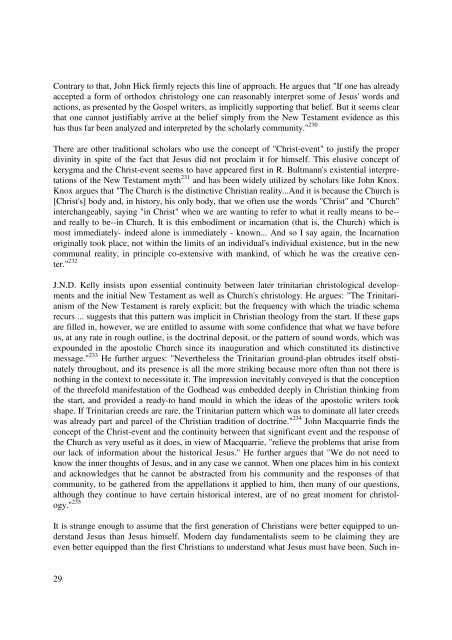Scripture and God in Christianity
Scripture and God in Christianity
Scripture and God in Christianity
You also want an ePaper? Increase the reach of your titles
YUMPU automatically turns print PDFs into web optimized ePapers that Google loves.
Contrary to that, John Hick firmly rejects this l<strong>in</strong>e of approach. He argues that "If one has already<br />
accepted a form of orthodox christology one can reasonably <strong>in</strong>terpret some of Jesus' words <strong>and</strong><br />
actions, as presented by the Gospel writers, as implicitly support<strong>in</strong>g that belief. But it seems clear<br />
that one cannot justifiably arrive at the belief simply from the New Testament evidence as this<br />
has thus far been analyzed <strong>and</strong> <strong>in</strong>terpreted by the scholarly community." 230<br />
There are other traditional scholars who use the concept of "Christ-event" to justify the proper<br />
div<strong>in</strong>ity <strong>in</strong> spite of the fact that Jesus did not proclaim it for himself. This elusive concept of<br />
kerygma <strong>and</strong> the Christ-event seems to have appeared first <strong>in</strong> R. Bultmann's existential <strong>in</strong>terpretations<br />
of the New Testament myth 231 <strong>and</strong> has been widely utilized by scholars like John Knox.<br />
Knox argues that "The Church is the dist<strong>in</strong>ctive Christian reality...And it is because the Church is<br />
[Christ's] body <strong>and</strong>, <strong>in</strong> history, his only body, that we often use the words "Christ" <strong>and</strong> "Church"<br />
<strong>in</strong>terchangeably, say<strong>in</strong>g "<strong>in</strong> Christ" when we are want<strong>in</strong>g to refer to what it really means to be-<strong>and</strong><br />
really to be--<strong>in</strong> Church. It is this embodiment or <strong>in</strong>carnation (that is, the Church) which is<br />
most immediately- <strong>in</strong>deed alone is immediately - known... And so I say aga<strong>in</strong>, the Incarnation<br />
orig<strong>in</strong>ally took place, not with<strong>in</strong> the limits of an <strong>in</strong>dividual's <strong>in</strong>dividual existence, but <strong>in</strong> the new<br />
communal reality, <strong>in</strong> pr<strong>in</strong>ciple co-extensive with mank<strong>in</strong>d, of which he was the creative center."<br />
232<br />
J.N.D. Kelly <strong>in</strong>sists upon essential cont<strong>in</strong>uity between later tr<strong>in</strong>itarian christological developments<br />
<strong>and</strong> the <strong>in</strong>itial New Testament as well as Church's christology. He argues: "The Tr<strong>in</strong>itarianism<br />
of the New Testament is rarely explicit; but the frequency with which the triadic schema<br />
recurs ... suggests that this pattern was implicit <strong>in</strong> Christian theology from the start. If these gaps<br />
are filled <strong>in</strong>, however, we are entitled to assume with some confidence that what we have before<br />
us, at any rate <strong>in</strong> rough outl<strong>in</strong>e, is the doctr<strong>in</strong>al deposit, or the pattern of sound words, which was<br />
expounded <strong>in</strong> the apostolic Church s<strong>in</strong>ce its <strong>in</strong>auguration <strong>and</strong> which constituted its dist<strong>in</strong>ctive<br />
message." 233 He further argues: "Nevertheless the Tr<strong>in</strong>itarian ground-plan obtrudes itself obst<strong>in</strong>ately<br />
throughout, <strong>and</strong> its presence is all the more strik<strong>in</strong>g because more often than not there is<br />
noth<strong>in</strong>g <strong>in</strong> the context to necessitate it. The impression <strong>in</strong>evitably conveyed is that the conception<br />
of the threefold manifestation of the <strong>God</strong>head was embedded deeply <strong>in</strong> Christian th<strong>in</strong>k<strong>in</strong>g from<br />
the start, <strong>and</strong> provided a ready-to h<strong>and</strong> mould <strong>in</strong> which the ideas of the apostolic writers took<br />
shape. If Tr<strong>in</strong>itarian creeds are rare, the Tr<strong>in</strong>itarian pattern which was to dom<strong>in</strong>ate all later creeds<br />
was already part <strong>and</strong> parcel of the Christian tradition of doctr<strong>in</strong>e." 234 John Macquarrie f<strong>in</strong>ds the<br />
concept of the Christ-event <strong>and</strong> the cont<strong>in</strong>uity between that significant event <strong>and</strong> the response of<br />
the Church as very useful as it does, <strong>in</strong> view of Macquarrie, "relieve the problems that arise from<br />
our lack of <strong>in</strong>formation about the historical Jesus." He further argues that "We do not need to<br />
know the <strong>in</strong>ner thoughts of Jesus, <strong>and</strong> <strong>in</strong> any case we cannot. When one places him <strong>in</strong> his context<br />
<strong>and</strong> acknowledges that he cannot be abstracted from his community <strong>and</strong> the responses of that<br />
community, to be gathered from the appellations it applied to him, then many of our questions,<br />
although they cont<strong>in</strong>ue to have certa<strong>in</strong> historical <strong>in</strong>terest, are of no great moment for christology."<br />
235<br />
It is strange enough to assume that the first generation of Christians were better equipped to underst<strong>and</strong><br />
Jesus than Jesus himself. Modern day fundamentalists seem to be claim<strong>in</strong>g they are<br />
even better equipped than the first Christians to underst<strong>and</strong> what Jesus must have been. Such <strong>in</strong>-<br />
29
















